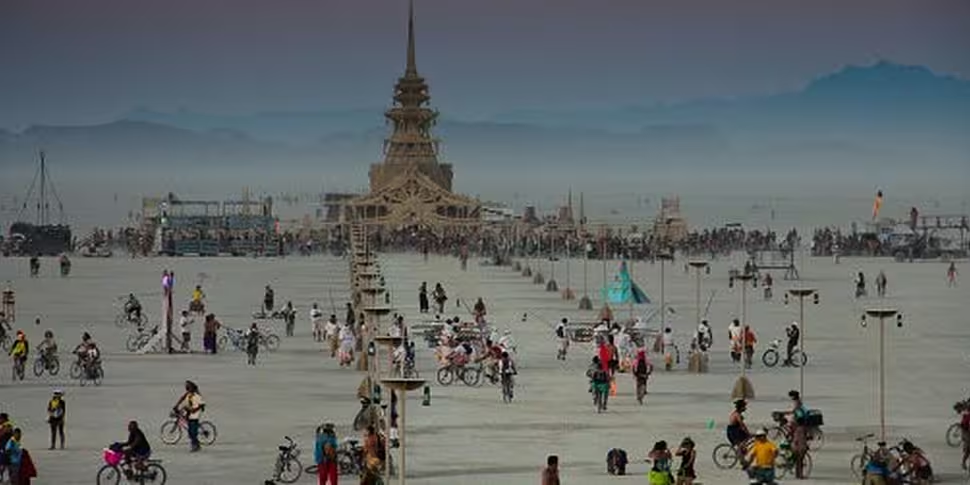Every year, tens of thousands of people descend on a temporary city in Black Rock Desert for Burning Man.
Harley K Dubois, founding member of the festival, first attended in 1991.
Back then, it was 250 people who randomly camped. Everyone respected the area - it was very casual and she was the only person who got up at 6am, filled with coffee, to meet all the people there.
It was Harley’s idea to line the streets with themes and stalls to define the streets in the desert. This became Black Rock City - the city that is now in Burning Man.
Now there are tens of thousands who attend Burning Man every year, with new locations partaking across the world including Brazil, South Korea, Argentina, Austria, Russia, Latvia, Greece, Russia and Canada.
International interest continues to grow as Burners from Dubai, Mexico, the Yucatan, Columbia, Chile, Turkey, Malaysia and Vietnam have reached out to express their interest in representing Burning Man in their home countries.

Burning Man 2012. Image: Stuart Chambers
What is Burning Man?
Speaking on Moncrieff, Dubois said there is no set programme at Burning Man - rather, it is merely a vessel.
"[It's] the crossroads between science and art; or the crossroad between community building and governance and technology," she said. "Where do those things meet, and what happens in those moments?"
Essentially, Burning Man is a temporary city in the desert, with infrastructure, radio stations, bars, restaurants, etc. Once you're inside the event, it's all provided as a gift from other citizens of Black Rock City - it's all free.
Once you're in the gates, you can only buy a very tiny selection of things - coffee, lemonade, ice, gasoline, RV pumping, and a couple other services like that.
It is not:
- A music festival. While plenty of musical performances take place, Burning Man doesn't pay anyone to perform, and doesn't have anything to do with the actual organisation organisation of musical demonstrations.
- A rave. Again, there are raves at Burning Man, but it's certainly not a constant rave or a concert any more than Chicago or London are raves or concerts.
The heaviest regulation of the festival, according to Dubois, is peer-to-peer.
"People expect others to know what to do and to behave properly, and people call themselves on it."
Burning Man doesn't have a specific demographic either - Dubois explains that the month-long festival attracts people from all walks of life, with a wide range of beliefs.
"You can't really say, this person goes to Burning Man, and this person doesn't. It's really diverse."
More families are attending compared to the early days. As a result, Dubois has made changes to reflect that, including the introduction of zoning within the site.
When it comes to activities at the festival - how does flaming bowling sound? As mentioned, there is no set schedule at the festival, but the best events in Dubois' mind, are the ones in which you engage with others.

Burning Man 2012. Image: Stuart Chambers/Flickr
The 10 Principles of Burning Man
- Radical Inclusion
Burning Man accepts anyone, provided they behave within the general guidelines.
- Gifting
If there is an 'economy' on the playa, it's one of gifting - not selling, not bartering or trading.
That means that folks are willing to give each other things of value (physical things, services, etc without any kind of expectation of return. It's explicitly not an exchange. It's about giving gifts, and taking joy in the giving of them.
You walk up to a bar, they give you a drink. You hand out necklaces, you expect nothing in return. Similarly, when given something, don't feel compelled to try to give something back.
- De-commodification
Burning Man attempt to create an environment relatively free of commercialism.
Obviously pretty much everybody who attends participates in capitalism of some kind, but it's about not being subject to the blatant and overwhelming commercial forces while on the playa that we're subject to off it.
- Radical Self-reliance
Take care of your own needs and don't make others rescue you.
- Radical Self-expression
Be yourself and be accepting of others doing the same. It's not more complicated than that.
- Communal Effort
Burning Man value the creation of public spaces and community, whether intentional or spontaneous. Work together to make and do things, and by doing so bring us all closer.
- Civic Responsibility
Burning Man believe in being responsible citizens, and treating the community around us as something important. As such, participants try to be kind to each other, and not bring harm to one another.
- Leaving No Trace
The Bureau of Land Management requires the festival to very strictly minimise its impact on the land in order to retain permission to hold the event here.
There are teams of volunteers who literally go over the 9+ square miles of Burning Man inch by inch after it's over, looking for things as small as splinters, in order to leave as little a trace as possible.
- Participation
Don't be a tourist. Participate! Remember: Burning Man isn't a festival. It's not a concert. It's not an amusement park. The Burning Man organisation doesn't provide anything but the infrastructure, the Man, and the Temple. Everything else is built, ad hoc, by we who attend the event.
Building something crazy isn't expected of participants - all you have to do is become part of the culture. Talk to people. Accept their offers of food or drink. Go experience the art.
- Immediacy
Be here, now. It's as simple as that.
Harley K Dubois is in Ireland for the Best in Fest ICON - a full day masterclass bringing together eight iconic founders and organisers from across the global festival and events space to share their stories and inspire.









